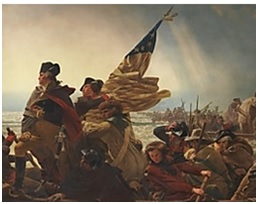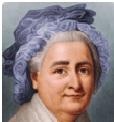|
 |
|
 |
|
|
||
George Washington Leadership
George Washington (1732-99)
First American president (pictured right) who defeated the British in the American War of Independence, 1775-83). His family emigrated from the North of England in 1709.
For more detail see... The American Declaration of Independence in the History Highlights section.
Why was he a great leader?
1. Love and respect People loved him because of his:
As soon as he became president, he made a nationwide tour introducing himself to ordinary people and listening to what they wanted. He was so respected by his troops that they accepted his tough discipline (see point 4), and didn’t mutiny when they were unpaid. He made them feel good by:
Before the crossing of the Delaware River (pictured right above in Emanuel Leutze's painting), he inspired his demoralized troops with the reading of Thomas Paine's revolutionary pamphlet, The American Crisis.
2. Learning and self-improvement Washington (pictured right aged 40) was a self-made man, who continually learned from his experience and mistakes including his early defeats in the war. “To err is natural, to rectify error is glory”, he said.
3. Integrity and principle He was a good man who lived by his principles: freedom and justice for all Americans, compassion and honesty. One legend (probably untrue) describes him as a six-year- old admitting to his father that he had killed a little cherry tree. “You know I can’t tell a lie”, he said. He was absolutely certain that the war against the British was right and just. “We are only defending what we deem our indisputable right”, he told his army, and “you are free men, fighting for the blessings of liberty”.
4. Tough He instilled discipline into his army by introducing new rules and regulations, fiercely enforced by flogging or (for cowardice) death. “Discipline is the soul of an army”, he said. He was particularly tough on cowardice, betraying friends, and failure to admit mistakes or do your duty. “Conquer or die”, he told his army in 1776. He showed his troops concern but kept his distance. “Be easy, but not too familiar” was his policy.
5. Purpose, consensus and caution His main aim was to preserve the unity and freedom of the American
people. So he avoided “foreign entanglements” and extremes in domestic policy, standing above the petty squabbles of party politics. His first Cabinet included people from each main political party to keep them united, but Thomas Jefferson (pictured right) resigned in 1794 over a policy disagreement. Washington wanted to be the best in everything he did, because of his fear of failure and letting people down. So he never took unnecessary risks and preferred action based on reasoned argument rather than instinct.
6. Duty He didn’t want to be either commander-in-chief or president, preferring the quiet life on his beautiful Virginian farm and mansion, Mount Vernon. But he did both jobs and risked everything, because his country needed him. “I consider myself to have done only my duty”, he said after his final victory over the British at the Battle of Yorktown in 1781, pictured right firing the first shot.
7. Self-control and determination He controlled his temper and natural aggression. His calm dignity came from his belief that a leader should look and act like one and be calm in a crisis. His dignity was reinforced by his high social status, immaculate dress and physique (see point 8). He persevered through bad times and good to give America democracy and its independence. He rarely showed any despair or discouragement, even in the desperate times of January 1776 when he had an undisciplined army with no money to pay them and little gunpowder. “Perseverance and spirit have done wonders in all ages”, he said.
8. Physique He was tall, strong, and the best horseman of his age, according to Thomas Jefferson. He loved hunting which gave him great stamina.
9. Bravery He had no fear under fire. “I heard the bullets whistle and believe me there is something charming in the sound”, he said as a young army officer.
10. Self-knowledge and realism He was always aware of his strengths and limitations, facing reality and avoiding self-delusion.
11. Support His loving wife, Martha, pictured right, helped him in troubled times.
12. Strategist As a young army officer, he learned to adapt his plans to changing circumstances. He had a great eye for detail and the ability to see the bigger picture i.e. how the detail helped to achieve his main aims like winning the war. He always made sure people concentrated on these aims.
Key quote on happiness Happiness and moral duty are inseparably connected.
Key quote on war To be prepared for war is one of the most effective means of preserving peace.
Key quote on the learning organization We should not look back unless it is to derive useful lessons from past errors.
Key quote on freedom Liberty, when it begins to take root, is a plant of rapid growth.
Key quotes on leadership Example, whether it be good or bad, has a powerful influence. I have no other view but to promote the public good.
Key quote on success Perseverance and spirit have done wonders in all ages.
Key quote on business success A people... who are possessed of the spirit of commerce who see and who will pursue their advantages may achieve almost anything.
Key quote on government Morality is a necessary spring of popular government. |
|
|
||
|
|
||
| Copyright © wisdomtowin.com 2025 All Rights Reserved | ||
|








